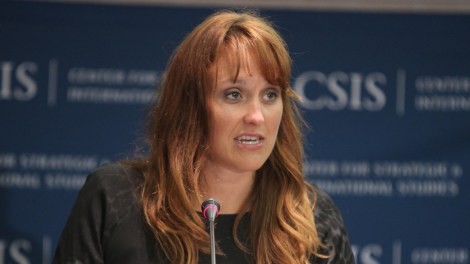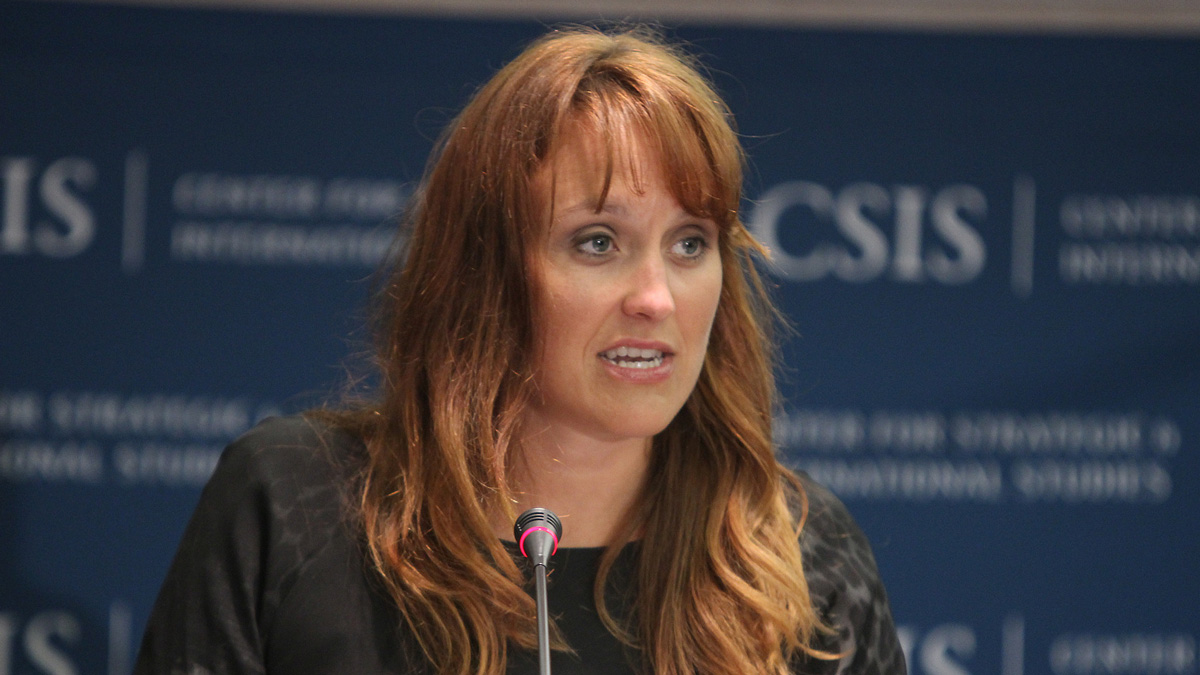
Center for Strategic & International StudiesHeather Zichal will be missed by enviros in D.C.
Remember the war over czars? No, that’s not an obscure episode in Russian history. It was the outrage manufactured by conservative media figures in 2009 over the proliferation of policy “czars” in the Obama administration. Never mind, of course, that President George W. Bush had 35 czars compared to Obama’s 32.
One of the new czarships Obama actually did create was the “climate czar,” a post to which he appointed former EPA Administrator Carol Browner. (Her formal title was director of the White House Office of Energy and Climate Change Policy.) Glenn Beck, chief propagandist for the czar meme, was especially concerned by the creation of a “socialist” climate czar post.
Browner’s deputy, Heather Zichal, took over her responsibilities after Browner stepped down in 2011. But, as part of the April 2011 deal to avert a government shutdown, funding for the climate czar position was eliminated, so Zichal got no titular promotion. After almost five years in the White House, Zichal announced in October that she was leaving the administration. She’s been replaced by her White House colleague Dan Utech.
The Obama administration has often delighted, and often disappointed, environmentalists. So how did Zichal herself perform?
According to the nation’s top environmental lobbyists, she did an exemplary job. She worked as an internal advocate, convincing President Obama to move forward on climate change, over the objections of more cautious, corporatist advisors such as former chiefs of staff Rahm Emanuel and Bill Daley. She helped bring the administration’s attention back to climate after it turned to other matters following failure of cap-and-trade in Congress. “From what I could tell, Heather had developed a close working relationship with the president,” says David Goldston, director of government affairs at the Natural Resources Defense Council.
Environmentalists credit Zichal with playing an instrumental role in the administration’s following four achievements:
- The heavy investments in renewable energy in the 2009 stimulus package. “Wind and solar doubled in their deployment in Obama’s first term,” says Sierra Club lobbyist Melinda Pierce, crediting the billions of dollars in the Recovery Act for making that possible.
- Raising auto fuel-economy standards. Under Browner, Zichal worked to craft the higher average fuel-efficiency standards for cars and trucks that the Obama administration introduced in 2009. Says Pierce, “Heather was literally burning the midnight oil” when working on this issue, “which is part of why she’s probably ready to go.”
- EPA limits on mercury from new power plants. Zichal worked with then-EPA Administrator Lisa Jackson to promulgate the regulations that will both limit a dangerous toxin and make it that much harder to open a new coal-burning plant and force the social costs onto the rest of society.
- The Obama administration’s June release of its Climate Action Plan. “The greatest achievement was her work getting the administration and president to release a definitive climate plan,” says Goldston. “Our sense is that she was an advocate for that. There were other high-level people who were very reluctant to see the administration move on climate policy. She was willing to continue to push in the face of that.”
The most important component of that plan is the EPA’s forthcoming regulations on greenhouse gas emissions from power plants. Zichal is credited with advocating for those internally. Activists say she was also the central player in crafting the various lower-profile components of the inter-agency plan to reduce emissions. “No one really talks about other pieces of plan,” says Pierce. “There are new standards from HUD for new federally funded buildings, the Department of Defense is making sure it’s a leader in efficiency and renewable fuels. It was [Zichal] in the White House sort of at the center of negotiations across government. Obama says, ‘Everybody bring me your best ideas,’ and it’s Heather and her team who had to bring that to fruition.”
There are, of course, disappointments in Obama’s record on climate change. Most significantly, the Senate failed to pass the House’s cap-and-trade bill. That isn’t under the president’s control, but according to a deeply reported New Yorker piece by Ryan Lizza, Obama undermined the Senate negotiations by using an executive order to give away the treat — increased offshore oil drilling permitting — that was supposed to wash down the emissions cap for wavering senators. Cap-and-trade might also have had a better chance of passing if it had been pursued before health-care reform and financial reform. And Obama has generally been overly fond of oil and gas drilling. During the 2012 campaign, he boasted of having increased U.S. oil and gas output and pledged to “continue to open up new areas for drilling.”
But those decisions were made above Zichal’s pay grade.
Going forward, Utech will have his work cut out for him if he hopes to persuade Obama to scale back the dirty energy production. There are enormous open questions as to what the administration will decide on the Keystone XL pipeline, the strength of EPA regulations on power plants, and the strength of Bureau of Land Management rules for fracking on federal land.
Environmentalists say they are impressed with Utech, but there were no shortcomings in Zichal’s performance they are looking to improve upon. Says Tiernan Sittenfeld, senior vice president for government affairs at the League of Conservation Voters, “We’re big fans of hers and are going to miss her a lot.”



